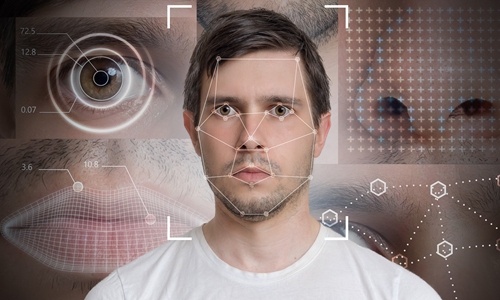New technology needs to balance privacy with utility

Photo: IC
A thief was captured in one of the buildings of my condominium on Tuesday. The news created a buzz about security among homeowners in our WeChat group. As we speculated about how the thief would have managed to sneak in and how to prevent such security breaches, someone mentioned using a facial scan machine at the gate to replace the conventional system that uses electronic key fobs.
"Many condominiums have upgraded their door control system with facial scan," the homeowner said. "It can help prevent strangers from entering."
According to media reports, more than 100 condominiums in Chengdu, capital of Southwest China's Sichuan Province, have installed such gadgets in recent years. After residents register their personal information - including taking a portrait photo - with the condominium association, they will need to stand still for one or two seconds before the screen to gain entry. Of course residents have the option of not going for the new system.
Some think this will help secure their community as the scanner can ring an alarm for police when it has come across the face of a wanted outlaw. Others feel facial scan will make their entry effortless, especially when both hands are occupied. And some others are concerned about their privacy.
"I feel like a naked man. My private information - address, family members, face, ID - is all there in the data bank," a man who decided not to go for the new technology as he had suffered a data breach, said.
After iPhone users began to unlock their cell phones by facial scans, ordinary people became more familiar with the technology - which no longer only appears in a 007 movie. Normally, people don't worry a lot about the safety of their biological information, such as face and fingerprint, collected by their cell phones that are personal items.
But a gate machine's data bank is not the same, even though the gadget companies have promised that the data is encrypted and they bear legal responsibility for protecting it.
Chinese people have become more concerned about information safety as they are worried about their privacy. I take this as a good sign for the consolidation of rule of law in Chinese society.
China has legislation to protect personal information, including facial information that is rarely involved in criminal cases in the country. But as technology develops rapidly, current laws and regulations may fall behind, creating potential legal loopholes.
Facial information is relatively special to people. No one would like to see their face appear at places it ought not to. People's collective concerns can encourage authorities to make quick moves in upgrading laws and regulations on collection, processing, storage and usage of facial information. This will not only fix potential legal loopholes but also guide the technology to develop in a direction that better serves people.
It is understandable that people hesitate to embrace new things when they feel insecure. The authorities should value such inhibition as it gives them a good opportunity to find and solve problems.
As for me, I would prefer to try new things. After all, there has to be someone to push forward the development, be it technology or something else.
The author is a reporter with the Global Times. xuhailin@globaltimes.com.cn